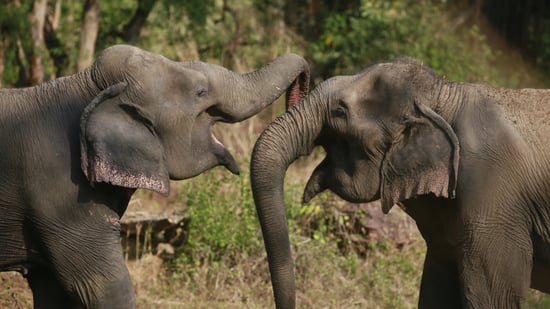World Wildlife Day
Animal Awareness Days
World Wildlife Day on March 3rd celebrates the natural world and its inhabitants. Join us in educating the world on why wildlife deserves a wild life.

Animal Awareness Days
The first of October is known worldwide as World Vegetarian Day.
On this day and during the month of October, vegetarians worldwide raise awareness and promote a vegetarian lifestyle.
World Vegetarian Day was started in 1977 by the North American Vegetarian Society and became endorsed by the International Vegetarian Union the following year.
This day was created to promote the compassion and joy associated with a vegetarian lifestyle. It is also used to inform others of the vegetarian lifestyle's benefits for both humans and animals.
World Vegetarian Day falls on October first of every year. It also kicks off Vegetarian Awareness Month, which ends on the first of November.
There are many benefits of World Vegetarian Day for both humans and animals. These benefits include:

When you make a donation, you’ll join a passionate group of supporters who are determined to change the world for animals. We're fighting animal cruelty wherever we find it — are you with us?
DonateWorld Vegetarian Day offers numerous ways to honour and raise awareness about the benefits of vegetarianism. While festivals and events provide a fun way to participate, here are some impactful and meaningful ways to celebrate:
Donate today to help us protect farmed animals from cruelty and advocate for a Just Transition to sustainable food systems.
There are lots of benefits to not eating meat.
Eating a plant-based diet is healthier than eating meat when we look at the risk of heart disease, cancer, and death.
However, simply avoiding meat doesn’t necessarily mean you’re eating a healthy diet. You still need to follow a balanced diet and ensure you’re getting all the required nutrients. That means eating a good mix of fruits, vegetables, starchy carbohydrates, and protein. Vegetarians can get protein in the form of tofu, tempeh, pulses, nuts, and seeds.
Vegetarianism helps animals in important ways.
By eating a plant-based diet, you help reduce the demand for meat and, by extension, help protect animals from factory farming. More than 70 billion animals are farmed each year — and 50 billion of them spend their lives on factory farms. They endure short, miserable lives and are often kept in cramped living conditions that prevent them from engaging in their natural behaviours.
Vegetarianism is also good for wildlife because it helps protect the Earth from factory farming. Forests and other natural habitats are being destroyed to make way for farms, so much so that grazing land and land used to produce feed for animals now take up one-third of Earth’s landmass. This mass deforestation reduces biodiversity and causes the loss of plant, insect, and animal species. It’s also speeding up climate change.
Factory farms are places where intensive animal farming is the norm. The priority is profit and high production, not animal welfare.
On factory farms, all animals are kept in cruel conditions.
Many factory-farmed animals live unnaturally short and distressing lives. This is why animal rights and vegetarianism go hand in hand; a plant-based diet helps prevent animal cruelty.
Yes, farm animals are sentient beings. The most intelligent farm animals have thoughts, feelings, and individual personalities.
Pigs can feel emotion and are highly intelligent. They learn quickly, have a good memory, and pick up on the emotions of others, demonstrating empathy. They use a variety of tones and noises to communicate, with nursing mothers even “singing” to their piglets as they suckle.
But pigs aren’t the only farm animals to display intelligence and emotion.
Sheep form friendships within their flock. They’re good problem-solvers and can remember up to 50 sheep and human faces. Ewes form deep bonds with their lambs, and all sheep develop their own personalities.
Similarly, cows experience a range of emotional states. They change their ear position and expose the whites of their eyes depending on how calm, excited, or fearful they’re feeling. They can also tell the difference between familiar and new objects and even recognise people from pictures.
Studies show that chickens possess some understanding of numbers. They demonstrate socially complex behaviours, have distinct personalities, and have complex negative and positive emotions.
Despite their reputation as unintelligent creatures, farm animals are clever and sentient with their own emotions and personalities.
Vegetarianism helps protect endangered species by reducing the demand for factory farming, a major driver of habitat destruction and animal endangerment.
Forests are often cleared to grow crops used to feed livestock, leaving endangered animals with less space to roam, feed, and reproduce. By choosing a plant-based diet, you help decrease the need for factory farms, decrease the environmental damage they cause, and save the habitat of endangered species.
Animal Awareness Days
World Wildlife Day on March 3rd celebrates the natural world and its inhabitants. Join us in educating the world on why wildlife deserves a wild life.
Animal Awareness Days
November 1st is World Vegan Day, which is a day to raise awareness and celebrate the vegan lifestyle and how it can benefit you, the animals, and the environment.
Animal Awareness Days
World Pangolin Day is observed on the third Saturday of February every year to celebrate pangolins and their contribution to the planet's ecosystem.
Blog
Discover the truth behind captive wildlife attractions. Learn why these cruel practices harm animals and how we can...
Blog
Discover how you can see elephants in a humane way without supporting harmful tourism practices.
Blog
Learn how climate change affects wildlife and ecosystems around the world. Discover ways to help protect endangered species...
Blog
Learn how ocean exploitation is harming marine wildlife and what we can do to protect the oceans. Support...